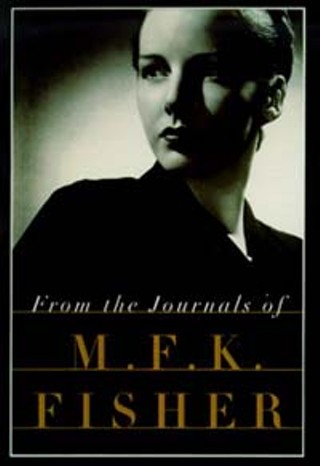Eating Between the Lines
Summer Reading, Culinarily Speaking
By Barbara Chisholm, Fri., June 2, 2000

From the Journals of M.F.K. Fisher
by M.F.K. FisherPantheon, 848 pp., $18 (paper)
M.F.K. Fisher loved to write and she loved to eat. Frequently she combined the two. The results are the benchmark titles An Alphabet for Gourmets, The Art of Eating, and The Gastronomical Me. Certainly there were times that she ate without putting the experience down on paper. And as the journals in this newly released collection attest to, sometimes she wrote without reflecting (at least, not much) on what she ate.
For those who have not discovered the pure joy of M.F.K. Fisher, The Journals of M.F.K. Fisher are a grand introduction to her wisdom, powers of observation, and reflection, not to mention her symphonic use of language -- which is not to say her language is adorned. On the contrary: Fisher's use of language is clean, simple, and surprising in its power. It appears so simple. That kind of writing is what is called well-crafted, of course.
In these entries and letters spanning almost 80 years, we accompany Fisher from her youth in California (Whittier and south), to her young adult years in France, and into her later years of aging and reflection. The book is a compendium of three previously released editions from her journal.To Begin Again includes stories and memoirs from 1908-1929; Stay Me, Oh Comfort Me, Fisher's journals and stories from 1933-1941; and Last House: Reflections, Dreams, and Observations, her writings from 1943-1991.
With the proliferation of memoirs that are churned out at an alarming rate these days, this collection gives a much-needed lesson on what makes a memoir work. Disclosing salacious details of every indiscretion is not literature. After a while, it isn't even interesting. But as Fisher deftly demonstrates, recounting an incidence requires a keen ear and eye for human behavior and an achingly tender sensitivity to a human's frailties. The detail of sight, sound, smell, and taste of a location or event brings episodes in Fisher's life alive to the reader. And her deeply held understanding of the dignity and folly of the people (especially herself) she describes keep these entries from becoming easy or cheap shots.
While it may seem likely that the middle section -- which deals with the most traumatic period of Fisher's life, including her divorce from her first husband, her marriage to their friend, and his subsequent illness and death -- is the most satisfying, each section holds its own particular charms. In the hands of an artist like M.F.K. Fisher, even the ordinary is literature.








